|
|
|
Sort Order |
|
|
|
Items / Page
|
|
|
|
|
|
|
| Srl | Item |
| 1 |
ID:
117958
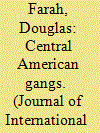

|
|
|
|
|
| Publication |
2012.
|
| Summary/Abstract |
This article will examine the changing roles of Central American gangs within the drug trafficking structures, particularly the Mexican drug trafficking organizations (DTOs), operating in the region. This will include the emerging political role of the gangs (Mara Salvatrucha or MS-13 as well as Barrio 18), the negotiations between the gangs and Mexican DTOs for joint operational capacity, the interactions between the two sides, and the significant repercussions all this will likely have across the region as the gangs become both better financed and more politically aware and active. This article is based on field research in San Salvador, where the author was able to spend time with some members of the MS-13. It is also informed by his examination of the truce between the gangs and the Salvadoran government, as well as the talks between the gangs and the Sinaloa cartel.
|
|
|
|
|
|
|
|
|
|
|
|
|
|
|
|
| 2 |
ID:
117961
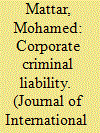

|
|
|
|
|
| Publication |
2012.
|
| Summary/Abstract |
The UN Convention against Transnational Organized Crime (UNCTOC) establishes criminal liability of the corporation as a legal entity in addition to the individual liability of persons who may be acting on behalf of the corporation. The purpose of this article is to address corporate criminal liability for illicit business practices that may be committed by a corporation in violation of international human rights law. This article will discuss corporate criminal liability under international conventional law and will discuss the extent to which U.S. domestic laws recognize corporate criminal liability. The article will highlight new trends in international law related to corporate liability, as well as instances where the legitimacy of corporate liability has been legally denied. Using Article 10 and domestic precedent, this article will argue that the role corporations play in international trade and development warrants their accountability and responsibility once they are involved in illicit business practices.
|
|
|
|
|
|
|
|
|
|
|
|
|
|
|
|
| 3 |
ID:
117964
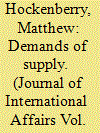

|
|
|
|
|
| Publication |
2012.
|
| Summary/Abstract |
Global trade can give rise to new economic possibilities in developing regions and open a boundless world of opportunity for design and production. The above map shows the supply chains behind electronics manufacture. Constructed by bringing together the routes of consumer electronics products at different stages of assembly, this map provides an overview of the network traveled in global manufacture. As production has become increasingly complex, actors have emerged to take advantage of friction inherent in supply lines. Each point and pathway shown on the map is a site for the potential proliferation of transnational conflict. The products we consume traverse convoluted
pathways of production; pathways put at risk by questionable practices that bring profits at the expense of working conditions, regional stability, and the environment. As seen in this supply chain, the smooth shells that characterize electronic objects can also be cracked by the jagged realities entailed in their construction.
|
|
|
|
|
|
|
|
|
|
|
|
|
|
|
|
| 4 |
ID:
117956
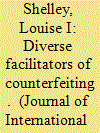

|
|
|
|
|
| Publication |
2012.
|
| Summary/Abstract |
Counterfeits may be the least policed form of transnational crime, although the profits from their sale total in the billions of dollars annually. The counterfeits traded by transnational criminals can be subdivided into two categories: those that merely represent copyright infringement and those that cause harm to life and society. In the first category are such counterfeits as clothing, purses, other consumer goods, and DVDs and other forms of intellectual property. In the second category are counterfeit pharmaceuticals, food, wine, cigarettes, and spare parts. Both forms of counterfeit, however, can be exploited by terrorists because of the low risk and high profits associated with this commerce that makes this trade more dangerous. The article will focus on the actors associated with this illicit trade, as well as the supply, the demand, and the limited law enforcement response. Particular focus will be paid to the counterfeits that cause harm to human life.
|
|
|
|
|
|
|
|
|
|
|
|
|
|
|
|
| 5 |
ID:
117965
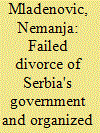

|
|
|
|
|
| Publication |
2012.
|
| Summary/Abstract |
This is how Milos Vasic ended his excellent book Atentat na Zorana in 2005, two years before the Special Court for The first democratically elected Prime Minister of Serbia, Dr. Zoran Djindjic, was assassinated in 2003 by an organized crime group closely connected to Serbian state institutions. The group had amassed enormous wealth through transnational drug trafficking. The political sponsors of Djindjic's assassination are still protected in Serbia today due to the high level of systemic corruption and a lack of political will to prosecute those responsible for this heinous crime. Since their protection impedes justice and, thus, obstructs the rule of law and democratic progress in Serbia, contemporary Serbian society could be seen as the hostage of transnational organized crime and corrupted state officials.
|
|
|
|
|
|
|
|
|
|
|
|
|
|
|
|
| 6 |
ID:
117960
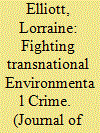

|
|
|
|
|
| Publication |
2012.
|
| Summary/Abstract |
Transnational environmental crime (TEC) is often not taken seriously within the broader policy and enforcement community. It is one of the fastest growing areas of cross-border criminal enterprise involving high profits and low risk for those involved in timber trafficking, wildlife smuggling, the black market in ozone-depleting substances, and the illegal trade in hazardous and toxic waste. TEC is increasingly characterized by commodity-specific smuggling networks, the intrusion of criminal groups involved in other forms of illegal trade and, in some cases, politically motivated organizations for whom this generates income to support other activities. But unlike other forms of transnational crime, there is no international treaty to prevent, suppress, and punish the kinds of trafficking and smuggling that constitute transnational environmental crime. The global regulatory and enforcement community has therefore developed innovative collaborative mechanisms to meet both the criminal and environmental challenges associated with this increasingly serious form of cross-border crime. Despite their successes, their efforts remain under-resourced. This article examines the challenges of TEC and efforts to respond to those challenges in the face of uncertain resources and limited awareness.
|
|
|
|
|
|
|
|
|
|
|
|
|
|
|
|
| 7 |
ID:
117962
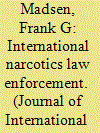

|
|
|
|
|
| Publication |
2012.
|
| Summary/Abstract |
This year sees the celebration of the first century of international legal provisions against the illicit production and trade of narcotics substances. Accordingly, this is an appropriate moment to evaluate the results obtained. The following essay considers how the international prohibition regime created the crime of drug trafficking. The ensuing function of denied demand is the inescapable basis for the development of organized crime. Second, costs of the regime are critically assessed. The former include institutional costs of law enforcement and of the incarceration of individuals sentenced for drug trafficking and related offences, e.g., violence and financial crimes. The indirect costs are difficult to gauge and impossible to monetize. They include the immense suffering caused by drug trafficking as well as the deterioration of public services due to corruption. The present situation on both sides of the U.S.-Mexico border is sufficiently eloquent evidence. Also, narcotics legislation leads to racial tension since the incarceration rates for non-whites for these offences is considerably higher than for whites in the United State and the United Kingdom. Third, political premises are briefly analyzed, namely the implementation of narcotics liaison offices in foreign jurisdictions and the linking of foreign aid and trade privileges to a certification of trade partners' adherence to U.S. antinarcotic drugs law enforcement. One might claim, somewhat counterintuitively, that decriminalization of drug trafficking is not necessary. Drug trafficking has already been decriminalized de facto, if not de jure, by the sheer, constant saturation of the market place.
|
|
|
|
|
|
|
|
|
|
|
|
|
|
|
|
| 8 |
ID:
117963
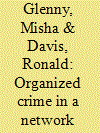

|
|
|
|
|
| Publication |
2012.
|
| Summary/Abstract |
The very benefits of the Internet make it susceptible to being used against individuals, organizations, and states. The changing role of organized crime in a networked society demands understanding the risks involved when using new technologies. Misha Glenny, author of McMafia: Journey through the Global Criminal Underworld, explores the transitions and rapid expansion of what he calls the "global shadow economy," which today accounts for approximately 15 to 20 percent of the world's GDP.[i] According to Glenny, the great danger of cybercrime is the high risk of potentially affecting a large part of the world that is linked to the web and that finds significant value in its interconnectedness. In this interview, conducted by Ronald Davis of the Journal, Misha Glenny exposes the inherent problems associated with the nature of the Internet with respect to organized crime.
|
|
|
|
|
|
|
|
|
|
|
|
|
|
|
|
| 9 |
ID:
117966
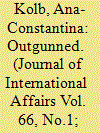

|
|
|
|
|
| Publication |
2012.
|
| Summary/Abstract |
Transnational organized crime (TOC) is an insidious and omnipresent element in twenty-first century Honduras, representing a clear threat to the stability of its democracy. Over the past five years, criminal organizations have extended their grip on the fragile states of the Northern Triangle-El Salvador, Guatemala, and Honduras-leading to a severe deterioration in citizen security. By leveraging domestic crime and violence, these organizations inhibit further development and prey on the glaring social inequality prevalent in these countries. This essay will use the definition of TOC as defined by the U.S. Strategy to Combat Transnational Organized Crime, which understands TOC as "those self-perpetuating associations of individuals who operate transnationally for the purpose of obtaining power, influence, monetary and/or commercial gains, or violence."1 The essay will mainly focus on transnational drug trafficking organizations (DTOs) actively operating in Honduras. First, the essay will give an overview of the operations and expansion of DTOs in the country. Subsequently, it will explore the effect of DTOs on Honduran governance and security. The essay will conclude with a review of current responses and recommendations for future policy.
|
|
|
|
|
|
|
|
|
|
|
|
|
|
|
|
| 10 |
ID:
117957
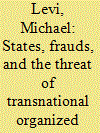

|
|
|
|
|
| Publication |
2012.
|
| Summary/Abstract |
Fraud and corruption are very serious threats to some states and are harmful to all; however, this threat is seldom connected to transnational organized crime (TOC). We cannot examine social problems in a vacuum; we have to construct images of threats through the lens of the social and political threats posed by different aspects of crime and its organization. Harm and threat are not just about their economic cost, but also about how different phenomena hurt our confidence that we can control our surroundings and our future expectations. This anxiety can affect entities such as nation states or even trans-state entities such as "Ummah Wahidah"-the Islamic global community. The aim of this article is threefold: to disentangle the real and imagined threats of fraud, detail the involvement of transnational organized crime groups in fraud, and determine who or what can be reasonably described as threatened by these phenomena. This article rejects the implicit binary view that states are either threatened or not threatened, referring rather to a scale of threat to both states and different sectors within the state. This article critiques the value of Moisés Naím's concept of 'mafia state' to explaining and understanding fraud.
|
|
|
|
|
|
|
|
|
|
|
|
|
|
|
|
| 11 |
ID:
117955
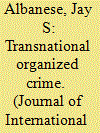

|
|
|
|
|
| Publication |
2012.
|
| Summary/Abstract |
Over the last twenty years, traditional depictions of organized crime as an ethnic, neighborhood phenomenon have given way to discoveries of emerging transnational criminal enterprises involving trafficking, fraud, and corruption on an international scale. The available evidence suggests that these are not two distinct types of criminal conduct. Instead they are overlapping in nature in terms of the crimes committed, the offenders involved, and in how criminal opportunities are exploited for profit. This article analyzes the similarities and differences between organized crime and transnational crime, concluding that they are in fact manifestations of the same underlying conduct and the same pool of criminal offenders. They involve exploitation of similar criminal opportunities, which have changed in form over time. Recommendations for more effective international prevention and responses are made in the context of assessing the remarkable transnational organized crime control efforts of the last decade.
|
|
|
|
|
|
|
|
|
|
|
|
|
|
|
|
| 12 |
ID:
117959
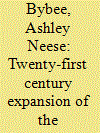

|
|
|
|
|
| Publication |
2012.
|
| Summary/Abstract |
In the last decade, West Africa emerged as a major transit hub for Latin American Drug Trafficking Organizations (DTOs) transporting cocaine to Western Europe. Since that time, there has been cause for hope and despair. The UN Office on Drugs and Crime (UNODC), the Economic Community of West African States (ECOWAS), and an array of international donors have made great strides in acknowledging the growing problem of drug trafficking and have implemented practical measures to stem this flow. All the while, the fears of many observers have been confirmed as the insidious effects of the drug trade have begun to take effect in many West African states. Consumption is on the rise and narco-corruption now undermines the rule of law and legitimate economic growth necessary for development and stability. One of the most alarming trends that place Africa and Africans on the radar of policy makers, law enforcement, and researchers alike is the number of new fronts on which the illicit drug trade is growing. Its geographic expansion beyond the relatively confined region of West Africa is now endangering East and Southern Africa. The arrival of new drugs to the region-heroin and Amphetamine-Type Stimulants (ATS, commonly referred to as synthetic drugs)-has been accompanied by the discovery of local manufacturing facilities to process them. Lastly, the growing level of involvement by Africans-who initially served as facilitators but now appear to be taking a more proactive role-raises concerns that a new generation of African DTOs is rising in the ranks. This paper examines how each of these trends are contributing to the twenty-first century expansion of the drug trade in Africa and summarizes some of the impacts they are having on the states and their populations.
|
|
|
|
|
|
|
|
|
|
|
|
|
|
|
|
|
|
|
|
|